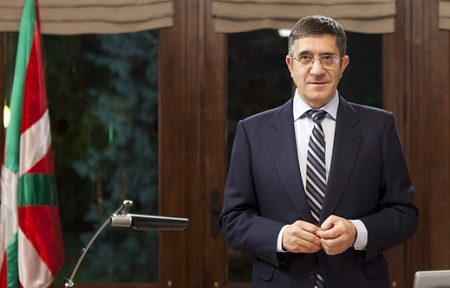Galicia, this Sunday, joins Euskadi (i.e., the Basque Country) in holding regional elections, each of which will have national significance for the center-right government of prime minister Mariano Rajoy.![]()
![]()
But unlike in Euskadi and especially in the upcoming November elections in Catalunya, the election in Galicia isn’t about the increasingly polarized fight over regional autonomy and independence, but about the budget priorities of the national and Galician government at a time of prolonged economic duress.
In Galicia, Rajoy’s home region, polls have consistently shown that the center-right government of Galician president Alberto Núñez Feijóo (pictured above) will win by law the largest share of the vote, although it will need to win an absolute majority of the 75 seats in the Parlamento de Galicia in order to continue governing Galicia — the difference between 37 seats and 38 seats could mean the difference between government and opposition.
Since Feijóo announced the early elections last month, polling has shown remarkably stable support for Feijóo’s party, the Partido Popular de Galicia (PPdeG, the People’s Party of Galicia), the Galician branch of Rajoy’s own Partido Popular (PP, People’s Party).
But if the PPdeG wins less than 38 seats on Sunday, the three opposition parties could unite to form a leftist coalition.
For example, the center-left Partido dos Socialistas de Galicia (PSdeG-PSOE, Socialist Party of Galicia), the Galician version of the Partido Socialista Obrero Español (PSOE, Spanish Socialist Workers’ Party) and the nationalist Bloque Nacionalista Galego (BNG, the Galician Nationalist Bloc), a nationalist Galician party, which also tilts to the left, formed a narrow one-seat governing coalition from 2005 to 2009. That coalition was Galicia’s first center-left government since the normalization of democratic politics in Spain in the early 1980s.
In addition, the Esquerda Unida-Izquierda Unida (EU-IU, the United Left), the regional variation of the stridently leftist Izquierda Unida (IU, United Left), essentially the remnants of Spain’s communist party, looks set to win its first seats ever in Galicia, reflecting a nationwide resurgence for the radical left in the wake of four years of economic depression, unemployment and increasingly stringent budget cuts from governments of both the center-left and center-right.
As such, the Galician election is the first major electoral test for Rajoy’s government, which is already unpopular in its first year after passing increasingly severe austerity measures. If Feijóo loses the election, it will an incredible embarrassment, given that it’s Rajoy’s home base (he once served in the Galician parliament) and Galicia has long been a traditional center-right stronghold in Spain.
In some ways, the Galician election is for Rajoy and the PP what the earlier March 2012 regional elections in the left-leaning Andalucía region of southern Spain were for the PSOE. In that election, the PP marked its best performance yet — winning three more seats than the PSOE. Although the PSOE continues to govern in coalition with the Andalucian version of the United Left, and the PP did not win an absolute majority of seats, as some had predicted, it marked a low point for the PSOE in what should be its traditional stronghold. Continue reading Economy and budget woes, not regional independence, mark Galicia’s election campaigns






